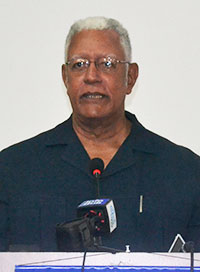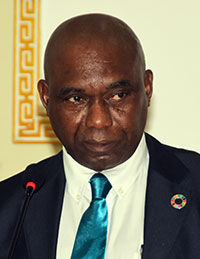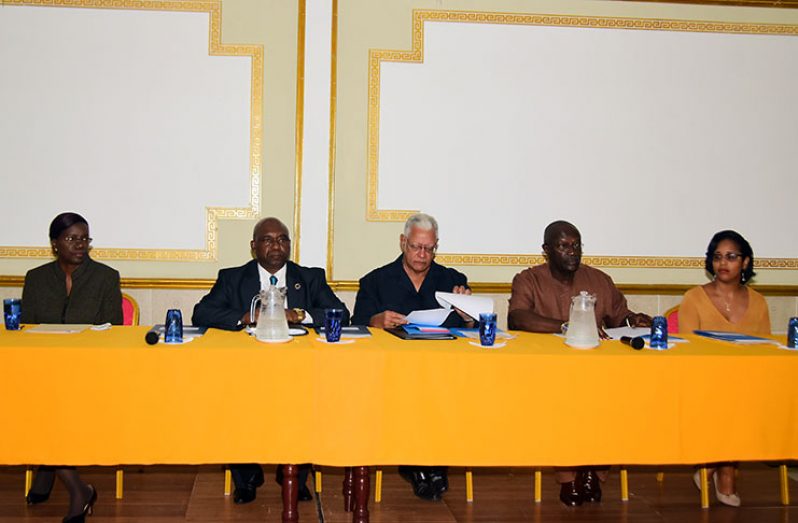— more focus on developing agriculture in the hinterland
FOOD and Agriculture Organisation (FAO) country representative to Guyana, Reuben Robertson has called on Guyana and its partners to work together to strengthen systems and find new approaches to agriculture and rural development here.Robertson made the call Wednesday at a national dialogue on the 35th FAO regional conference of Latin America and the Caribbean and accountability of FAO’s stewardship workshop held at the Regency Suites, Hadfield Street, Georgetown.

The 35th FAO regional conference of Latin America and the Caribbean will be held from March 5 to 8 in Montego Bay, Jamaica and according to the country representative, greater focus needs to be placed on the challenges posed to ending hunger, achieving food and nutrition security and eradicating all forms of malnutrition.
“Let us look at the initiatives and innovations necessary to reduce the impacts of climate change on agriculture and build resilience in the agriculture sector,” said Robertson who noted that efforts must not only be centred on the coast but also the hinterland.He believes that focus needs to be placed on transitioning agriculture in the hinterland regions.
“Let us see how together we can make agriculture more responsive, efficient, productive and inclusive through the establishment of more intensive sustainable systems that help to reduce greenhouse gas emissions and contribute to Guyana becoming the first green state in the region.” Through dialogue, Robertson said the real challenges facing the agriculture sector can be addressed, especially in light of 2020 being designated the year oil production is slated to start here.

“With the coming of oil in 2020, the movement of labour from a highly labour intensive agriculture to more lucrative paying jobs, to create shortages of labour for agriculture production in a sector which is already plagued with aging population, low productivity and which requires creativity and incentives to stimulate young people to become involved,” he stated.The FAO representative said too that without urgent modernisation, through the use of ICT within the sector, serious negative impacts can be seen. He pointed specifically to increases in the food import bill, food insecurity, increase in poverty due to inequality and the exclusion of sections of society as well as increased rural migration.
“We have very little time, less than 20 months to strengthen existing systems and to find new approaches to agriculture and rural development in Guyana if we are to fight inequality, overcome poverty, position the country to achieve sustainable development goals and have competitive and sustainable agriculture in a green state,” said Robertson.
Additionally, he said FAO and its sister agencies are committed and ready to contribute to such processes that would aid in the reduction of negative impacts on the agriculture sector. Robertson said too that the FAO recognises that much work is to be done if countries like Guyana are to achieve zero hunger, eliminate food insecurity and poverty, especially in rural communities. He stressed that to achieve such objectives there must be smart partnerships and joint approaches.

Minister of Agriculture, Noel Holder told the gathering of stakeholders of the role agriculture plays in the fight against poverty and food and nutrition insecurities, but noted that challenges exist. He, like Robertson, called for stronger partnerships to ensure positive results in the sector.
INCLUSIVE APPROACH
“As such, an inclusive development approach is necessary in realising the potential for agricultural advancement in the hinterland regions, and since taking office in 2015, this administration has placed great focus on exploiting the potential of those regions,” said Holder.
The agriculture minister also referenced his government’s Green State Development Policy which he reminded contributes not only to food and nutrition security, but to the eradication of poverty and employment. He stressed, however, that such systems must be accompanied by the relevant support areas including governance, legislations and policies.He echoed the call for better policies to address the increasing incidences of hunger in Latin America and the Caribbean.
“The Ministry of Agriculture, with the assistance of FAO, has developed and recently revised the National Food and Nutrition Security Strategy and Action Plan, the guiding policy to achieving Sustainable Development Goal 2, Zero Hunger, being a net exporter of food and being recognised globally as being food secure,” the minister stated.Permanent Secretary in the Ministry of Education, Vibert Welch who represented subject Minister Nicolette Henry, pointed to increased incidences of hunger and the growing number of cases of obesity which he said has now become an epidemic.
Referencing the effects of climate change which threatens agriculture and the livelihood of persons who depend heavily on same, Welch said the challenges for food security in Latin America and the Caribbean must be discussed so that solutions can be found. “It behooves us to discuss solutions to these challenges with a view of developing an agenda to fight hunger and malnutrition, build a future without rural poverty and transform agriculture to be sustainable and resilient to climate change,” said Welch.
He said for the Ministry of Education’s part, it has been educating the nation’s children about the importance of agriculture and food security and the effects of climate change. The permanent secretary noted too that his ministry has implemented the school feeding programme which benefits students not only on the coast but also hinterland regions. Meanwhile, the FAO intends to provide support to Guyana by implementing an agricultural census geared at improving the agricultural statistical system, monitoring and implementing policy plans developed, and benchmarking data on the structural characteristics of Guyana’s agriculture.
Additionally, support would be provided through sustainable land development project, fostering efficient, inclusive and sustainable food systems in support of agricultural diversification here; resuscitating domestic milk production here, characterisation of breadfruit germplasm and the establishment of a germplasm bank. The FAO will also facilitate the making of fish feed from local food stuff, strengthen capacity for the implementation of post state measures agreement and ensure the long-term productivity of lowland tropical forests in the Caribbean.
The 35th FAO Regional Conference, which is being held within the Region for the first time in 20 years, provides a forum for Ministers of Agriculture from 33 member countries and other high-level officials to meet, and deliberate on challenges and matters relative to food and agriculture. Over the years, the Ministry of Agriculture has worked with a number of international agencies to target vulnerable groups in its efforts to achieve all of the FAO’s Sustainable Development Goals by 2030. Guyana will be represented by Ministers of Agriculture and Education, Noel Holder and Nicolette Henry, respectively.




.png)









